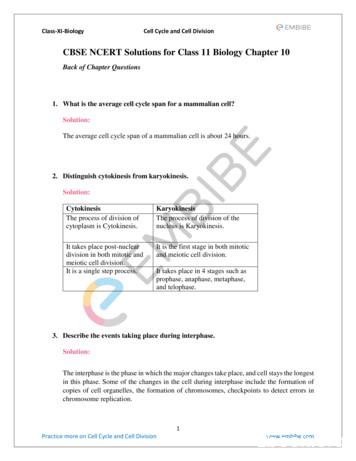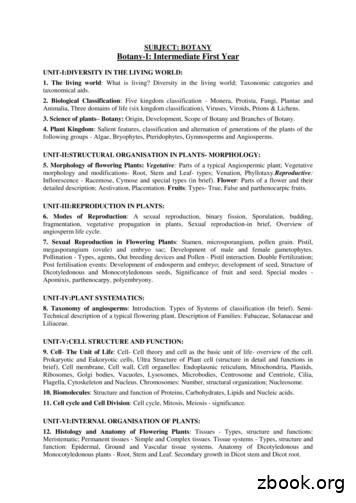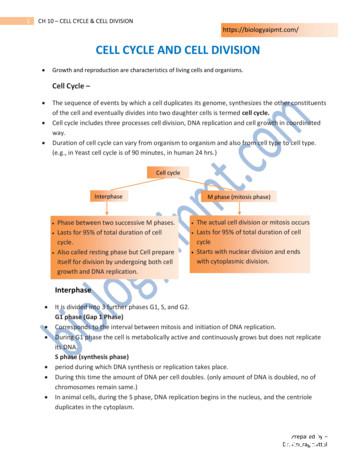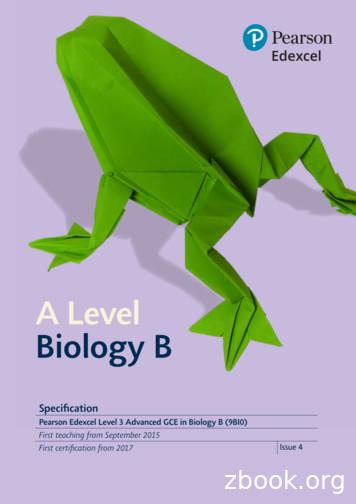Unit 1 Cell Biology Topic 1 Cell Structure-PDF Free Download
animation, biology articles, biology ask your doubts, biology at a glance, biology basics, biology books, biology books for pmt, biology botany, biology branches, biology by campbell, biology class 11th, biology coaching, biology coaching in delhi, biology concepts, biology diagrams, biology
Class-XI-Biology Cell Cycle and Cell Division 1 Practice more on Cell Cycle and Cell Division www.embibe.com CBSE NCERT Solutions for Class 11 Biology Chapter 10 Back of Chapter Questions 1. What is the average cell cycle span for a mammalian cell? Solution: The average cell cycle span o
National 4 Biology Unit 1 Cell Biology Summary Notes. 1. Cell division and it’s role in growth and repair. Cell division The process of cell division is called mitosis. Each cell must divide to ensure the exact same genetic . 6/20/2017 11:00:34 AM .
UNIT-V:CELL STRUCTURE AND FUNCTION: 9. Cell- The Unit of Life: Cell- Cell theory and cell as the basic unit of life- overview of the cell. Prokaryotic and Eukoryotic cells, Ultra Structure of Plant cell (structure in detail and functions in brief), Cell membrane, Cell wall, Cell organelles: Endoplasmic reticulum, Mitochondria, Plastids,
Timeframe Unit Instructional Topics 4 Weeks Les vacances Topic 1: Transportation . 3 Weeks Les contes Topic 1: Grammar Topic 2: Fairy Tales Topic 3: Fables Topic 4: Legends 3 Weeks La nature Topic 1: Animals Topic 2: Climate and Geography Topic 3: Environment 4.5 Weeks L’histoire Topic 1: Pre-History - 1453 . Plan real or imaginary travel .
of the cell and eventually divides into two daughter cells is termed cell cycle. Cell cycle includes three processes cell division, DNA replication and cell growth in coordinated way. Duration of cell cycle can vary from organism to organism and also from cell type to cell type. (e.g., in Yeast cell cycle is of 90 minutes, in human 24 hrs.)
Figure 6-17a Essential Cell Biology ( Garland Science 2010) 21. Figure 6-17b Essential Cell Biology ( Garland Science 2010) 22. Figure 6-16 Essential Cell Biology ( Garland Science 2010) 23. 24. 25. Figure 6-19 Essential Cell Biology ( Garland Science 2010) 26.
(Biology-Miller & Levine) & OUHSD Recommended Labs Content Vocabulary Cell Structure 3 weeks Biology/Life Science, Cell Biology: 1c, 1d, 1e, 1f, 1g & 1j* Chapter 7 Cell Microscopy Lab Osmosis Lab 1. Prokaryotic cell 2. Eukaryotic cell 3. Nucleus 4. Cell membrane 5. Semipermeable 6. Phospholipids 7. Hydrophilic 8. Hydrophobic 9. Cytoplasm 10 .
Topic 5: Not essential to progress to next grade, rather to be integrated with topic 2 and 3. Gr.7 Term 3 37 Topic 1 Dramatic Skills Development Topic 2 Drama Elements in Playmaking Topic 1: Reduced vocal and physical exercises. Topic 2: No reductions. Topic 5: Topic 5:Removed and integrated with topic 2 and 3.
DAT Study Tips* Biology Materials: DAT Destroyer, Feralis Biology Notes, Cliff's AP Bio 3rd Edition, DAT Bootcamp (Both Cliff’s AP Bio and Feralis Notes are free online) Biology is one of the most time consuming sections to study for, given that the scope of the material covered in DAT biology is so randomly big. Cliff's AP Bio 3rdFile Size: 527KBPage Count: 9Explore furtherDAT Bootcamp Biology Flashcards Quizletquizlet.comHow to Study for the DAT Biology Section the Right Way .datbootcamp.comFeralis Biology Notes DAT Study Tips Free Downloadferalisnotes.comFeralis Biology Notes? Student Doctor Network Communitiesforums.studentdoctor.netBiology Cumulative Exam Flashcards Quizletquizlet.comRecommended to you b
AQA GCSE BIOLOGY (9-1) Topic 1: Cell Biology 4.1.1 Cell structure 4.1.1.1 Eukaryotes and prokaryotes Plant and animal cells (eukaryotic cells) have a cell membrane, cytoplasm and genetic material enclose
BIOLOGY COURSE OUTLINE Unit 1 –Science & Chemistry of Life Unit 2 –Ecology Unit 3 –Cells & the Cell Cycle Unit 4 –Cellular Energy Unit 5 –Heredity Unit 6 –Nucleic Acids Unit 7 –Origin & Evolution of Living Things Unit 8 –Classification Unit 9 –Human Body Systems Textbook: Miller & Levine Biology *Class set only. No student .
AQA A LEVEL SOCIOLOGY BOOK TWO Topic 1 Functionalist, strain and subcultural theories 1 Topic 2 Interactionism and labelling theory 11 Topic 3 Class, power and crime 20 Topic 4 Realist theories of crime 31 Topic 5 Gender, crime and justice 39 Topic 6 Ethnicity, crime and justice 50 Topic 7 Crime and the media 59 Topic 8 Globalisation, green crime, human rights & state crime 70
Topic 1: Biological Molecules Topic 2: Cells, Viruses and Reproduction of Living Things Topic 3: Classification and Biodiversity Topic 4: Exchange and Transport Topic 5: Energy for Biological Processes Topic 6: Microbiology and Pathogens Topic 7: Modern Genetics. Overview of assessment Assessment is 1 hour 45 minutes.
AQA GCE Biology A2 Award 2411 Unit 5 DNA & Gene Expression Unit 5 Control in Cells & Organisms DNA & Gene Expression Practice Exam Questions . AQA GCE Biology A2 Award 2411 Unit 5 DNA & Gene Expression Syllabus reference . AQA GCE Biology A2 Award 2411 Unit 5 DNA & Gene Expression 1 Total 5 marks . AQA GCE Biology A2 Award 2411 Unit 5 DNA & Gene Expression 2 . AQA GCE Biology A2 Award 2411 .
IB Biology 9780198307747 IB Biology Course Book (Print Online) 134.95 IB Biology 9781927173930 Biozone IB Biology Student Workbook 49.95 IB Biology 9781927173947 Biozone IB Biology Model Answers 12.95 IB Biology 9780198393511 Biology for the IB Diploma - IB Study Guide 63.95
Biology, Mathematics, and a Mathematical Biology Laboratory 1.1 The Natural Linkage Between Mathematics and Biology Mathematics and biology have a synergistic relationship. Biology produces interest-ing problems, mathematics provides models to understand them, and biology
Content Unit 1: Biology and technology 1 1.1 Biology for Development 2 1.2 Technological products used in Biology 7 h Unit summary 16 h Review Exercise for Unit 1 17 Unit 2: cell Biology 21 2.1 Looking at Unicellular Organisms 22 2.2 Single Celled Organisms 25 2.3 Levels of Cellular Organization in multicellular organisms 38 h Unit summary 48 h Review Exercise for Unit 2 50
concentrate on molecular biology, cell biology, genetics, and their applications to problems in cell and developmental biology, neurobiology, and various aspects of computational and quantitative biology. Interdisciplinary opportunities are available within the major in the biotechnology, neurobiology and quantitative biology tracks.
Cell and Developmental Biology Concentration The Biology Major is for students who are preparing to (1) enter biology graduate and health professional schools, (2) seek biology-related careers in industry or government agencies, or (3) teach in secondary school. BIOLOGY CORE AND SUPPORTING COURSES Complete the courses listed below:
The Cell Cycle The cell cycle is the series of events in the growth and division of a cell. In the prokaryotic cell cycle, the cell grows, duplicates its DNA, and divides by pinching in the cell membrane. The eukaryotic cell cycle has four stages (the first three of which are referred to as interphase): In the G 1 phase, the cell grows.
Many scientists contributed to the cell theory. The cell theory grew out of the work of many scientists and improvements in the . CELL STRUCTURE AND FUNCTION CHART PLANT CELL ANIMAL CELL . 1. Cell Wall . Quiz of the cell Know all organelles found in a prokaryotic cell
Stent Type Stent Design Free Cell Area (mm2) Wallstent Closed cell 1.08 Xact Closed cell 2.74 Neuroguard Closed cell 3.5 Nexstent Closed cell 4.7 Precise Open cell 5.89 Protégé Open cell 20.71 Acculink Open cell 11.48 Stent Free Cell Area Neuroguard IEP Carotid Stent
Stent Type Stent Design Free Cell Area (mm2) Wallstent Closed cell 1.08 Xact Closed cell 2.74 Neuroguard Closed cell 3.5 Nexstent Closed cell 4.7 Precise Open cell 5.89 Protégé Open cell 20.71 Acculink Open cell 11.48 Neuroguard IEP Carotid Stent Stent Free Cell Area
The classical branch of biology that deals with the study of structure, function and life history of a cell is called “Cell Biology” 8.2 CELL THEORY: Cell theory was formulated by M J Schleiden (1838) and Theodore Schwann (1839). The main principles of cell theory are All living organisms are composed of cells and products of cells
Trigonometry Unit 4 Unit 4 WB Unit 4 Unit 4 5 Free Particle Interactions: Weight and Friction Unit 5 Unit 5 ZA-Chapter 3 pp. 39-57 pp. 103-106 WB Unit 5 Unit 5 6 Constant Force Particle: Acceleration Unit 6 Unit 6 and ZA-Chapter 3 pp. 57-72 WB Unit 6 Parts C&B 6 Constant Force Particle: Acceleration Unit 6 Unit 6 and WB Unit 6 Unit 6
4. Bozeman Biology: Evidence of Evolution 5. Bozeman Biology: Essential Characteristics of Life (preserved by natural selection) 6. Bozeman Biology: Natural Selection Unit Review (a review from the previous five videos) 7. Bozeman Biology: Solving Hardy Weinberg Problems 8. Bozeman Biology: Speciation and Extinction 9. Bozeman Biology .
Molecular and Cell Biology 1 Molecular and Cell Biology Bachelor of Arts (BA) The undergraduate major in Molecular and Cell Biology (MCB) focuses
garland science essential cell biology fourth edition essential cell biology ecb4 interactive dvd-rom inside a l b e r t s b r a y h o p k i n j o h n s on l e w i s r a f f r o b e r t s w a l t e r essential cell biology fourth edition alberts br
Teaching and learning 15 Differentiation 16 Units of Study 17 Unit 1: Scientific methods 18 Unit 2: Cell biology 19 Unit 3. Organisms and their ecology 20 Unit 4: Molecular biology 22 Unit 5: Systems biology 25 Assessment 28 Written examination 29 Se
Jan 21, 2020 · pertaining to the cell theory, structure and functions, cell types and modifications, cell cycle and transport mechanisms. This module has seven (7) lessons: Lesson 1- Cell Theory Lesson 2- Cell Structure and Functions Lesson 3- Prokaryotic vs Eukaryotic Cells Lesson 4- Cell Types and Cell
AP Biology Investigative Labs: An Inquiry Approach. CR2 CR2 Unit 4: Cell Communication and Cell Cycle . Advanced Placement Biology Sample Syllabus #1 . Philosophy . This AP. Biology course is designed to offer students a solid curriculum in introductory college-level biology, and the course focuses on enduring conceptual understandings
11 Topic #8: Accounting Basics31 12 Topic #9: Financing 35 13 Topic #10: Financial Models39 14 Celebration Of Knowledge #342 15 Topic #11: The Sales Role45 16 Topic #12: Business Development48 17 Topic #13: Negotiating50 18 Topic #14: Tactics, Strategy and Grand Strategy53 19 Celebration Of
1 week Stocks, Sauces, and Soups Topic 1: Stocks, Sauces, and Soups 1 week Communication Topic 1: Communication 1 week Management Essentials Topic 1: Multicultural Workplace Topic 2: SMART Goals 2 weeks Fruits and Vegetables Topic 1: Fruit Cooking Lab Topic 2: Vegetable Preparation Lab 1 week Serving Your Guests Topic 1: Importance of
GCSE BIOLOGY Exam board & title AQA GCSE Biology (AQA 8461) Paper and options Paper 1B-1hr 45 mins Paper 2B-1hr 45 mins Two tiers: Foundation (grades 1 to 5); Higher (grades 4-9) Paper 1- 50% Topic 1- Key concepts in biology Topic 2- Cells and control Topic 3-Genetics Topic 4- Natural selection and genetic modification
Week Date Day Lecture Topic Chapter Lab Topic 1 Jan 08 Mon S1/A1/A2i: . Jan 25 Thu Viral & Bacterial Genetics 19, 27.2 4 . Biology-6B is the second part of the three-quarter introduction to biology series for college students majoring in biology or a related science. Completion of Biol-6A (organismal biology) with a grade of C or better is a
Jan 17, 2018 · Biology: The Dynamics of Life, Glencoe Biology/Biophysical Science 2005 Modern Biology, Holt, Reinhart, and Winston Biology/Biophysical Science 2002 Biology, Prentice Hall Biology/Biophysical Science 2004 BSCS Biology: A Molecular Approach, 8th
Biology Biology 1 Part I (Grade XI) Topics and Sub-topics Student Learning Outcomes Cognitive Level1 K U A 1. Introduction to Biology Students should be able to: 1.1 Major Fields of Specialisation in Biology 1.1.1 differentiate among the branches of biology, i.e. fresh water biology, marine
2 Cell culture techniques A.R. BAYDOUN 2.1 Introduction 2.2 The cell culture laboratory and equipment 2.3 Safety considerations in cell culture 2.4 Aseptic techniques and good cell culture practice 2.5 Types of animal cell, characteristics and maintenance in culture 2.6 Stem cell culture 2. 7 Bacterial cell culture
A. Lower Division Cell Biology Course at San José State University. Our biology majors enroll in a three-semester core biology sequence (Biology 1, Biology 2, and Biology 3). Each course has a lecture and a laboratory component. All core courses are taught every semester, with an average of 100 students enrolled in each course. The pre-







































